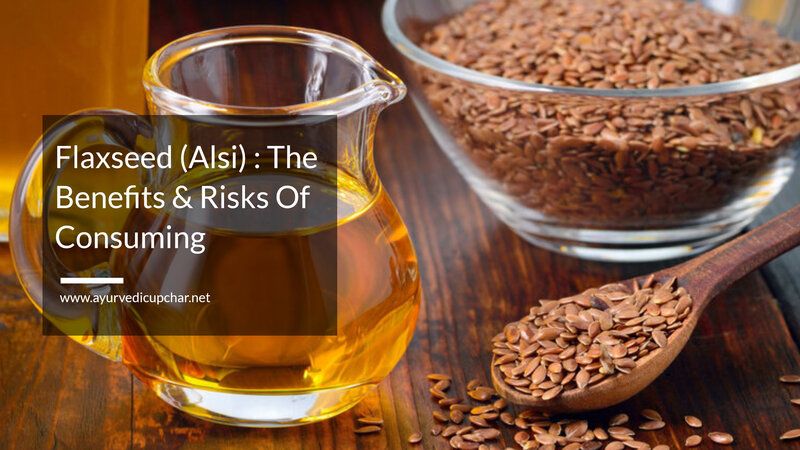Flaxseed (Alsi) : The Benefits & Risks Of Consuming
 Flax, or flaxseed in English and Alsi in Hindi is a food that has risen in popularity in recent years for its great health benefits. But beware! In addition to these benefits, flaxseed also has some risks.
Flax, or flaxseed in English and Alsi in Hindi is a food that has risen in popularity in recent years for its great health benefits. But beware! In addition to these benefits, flaxseed also has some risks.
The benefits of flaxseed come from its great nutritional content. What is it for? As the best source of omega-3 fatty acids, flaxseed is a great alternative to take care of the health of hair, nails, skin, and blood pressure and to balance cholesterol, prevent cancer, and even lose weight.
These benefits place flaxseed among the foods that we should include the most in our diet, although always taking into account its possible contraindications.
What is flaxseed?
Flaxseed is the seed of flax ( Linum usitatissimum ), a very recognized plant in the textile industry because its stem is used to make fabrics of the same name. Canada, Russia, China, and India are the largest flax growers.
Flaxseed, linseed, is used to extract its oil and to make flour, both for human consumption. Flaxseed oil is used in cooking and also in the cosmetic industry and its nutritional and health properties are its widely recognized benefits.
The benefits of flaxseed come from its composition consisting of a large percentage of dietary fiber (soluble and insoluble) and fatty acids such as omega 3, omega 6, omega 9, and linoleic. – all with great health benefits.
Additionally, flaxseed contains vitamin B1, copper, manganese, magnesium, phosphorus, and selenium.
Flaxseed contains more omega-3 than fish oil, being a perfect nutritional alternative to complement vegetarian diets.
Benefits of flaxseed or flaxseed
Flax is used for…
1. Allergies: Flaxseed has been used to reduce allergic responses to different sources and is known to enhance the body’s immune response when consumed regularly in the diet in the form of oil or seed.
2. Cancer: Several studies have shown that the regular consumption of omega 3 not only prevents the development of various forms of cancer but also eliminates existing cancer cells in some cases. The anticancer benefits of flaxseed make it an essential ingredient in our diet.
3. Heart: The omega-3 fatty acids in flaxseed help lower triglycerides and cholesterol in the blood, lower blood pressure, and lower the risk of heart attacks and pulmonary embolisms.
4. Pre-menstrual syndrome: Flaxseed benefits for women include regulating their cycle. Studies have shown that consuming flaxseed regularly helps relieve and eliminate premenstrual symptoms such as colic, irritability, and fluid retention.
5. Skin: Used in the diet or topically, flaxseed improves skin quality and texture, alleviating various conditions ranging from eczema to acne.
6. Digestion: Flaxseed is an excellent food for preventing and alleviating gastrointestinal conditions ranging from constipation to irritable bowel, gastritis, and enteritis.
7. Depression: Although it is a controversial topic, according to some experts, the habitual consumption of flaxseed regulates moods and prevents and alleviates the symptoms of depression.
How to consume flaxseed?
- The benefits of flaxseed can be taken advantage of when consumed as an oil, as a whole seed, or as a powder from the dried seed.
- Simply add the oil to your salads or food (one tablespoon a day), or add the seeds or seed powder to juices, soups, yogurt, salads, or cereals.
- There are also liquid supplements and flaxseed pills.
Remember to always ask your healthcare professional about the possible risks of flaxseed in your specific case.
Omega 3 deficiency symptoms
If you have any of these symptoms, you may benefit from introducing flaxseed to your diet:
- Dry skin
- Dandruff
- Weak nails
- Skin problems
- Menstrual cramps
- Fluid retention
- Digestive problems
Flaxseed Precautions and Risks
- Although there are no known major side effects or risks of flaxseed, caution is recommended in cases of low blood pressure, clotting problems, hormonal conditions, and gastrointestinal obstructions.
- Pregnant or lactating women should consult their doctors before introducing flaxseed to their diet as in some cases its consumption is not recommended.
- Among the risks of flaxseed is the interaction it has with some medications. Some drugs for diabetes interact negatively with flaxseed as well as some anticoagulants, so consuming flaxseed in these cases is considered risky.
- If you want to reap the benefits of flaxseed, always check with your healthcare professional first, especially if you are under treatment for a chronic condition.
Make sure you are not allergic to flax, starting with minimal doses.























